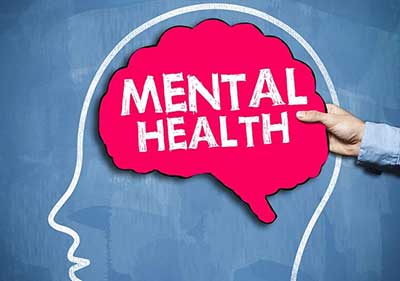Date : 11/10/2023
Relevance – GS Paper 2 - Health, Management of Social Sector, Government Policies & Interventions, Issues related to development of social sector involving healthcare etc
Keywords – Informal sector, Mental Health, Employment, SDGs
Context
This year's World Mental Health Day, celebrated on October 10, focuses on the theme of 'mental health as a universal human right.' One frequently disregarded group in discussions about mental health is informal workers.
Unorganised/Informal sector in India
India's informal sector constitutes a substantial portion of its labor force, with 80% engaged in informal employment compared to the formal sector's 20%. Within this informal sector, half work in agriculture, and the rest are employed in non-agricultural fields. Despite their significant contribution to the national income, informal workers face continuous exposure to economic, physical, and mental vulnerabilities.
Correlation of Employment & Mental Health
Decent work positively influences mental health, but unemployment, unstable employment, workplace discrimination, and unsafe working environments can jeopardize mental well-being. Workers in low-paid, insecure jobs are more susceptible to psychosocial risks, compromising their mental health. According to the United Nations Development Programme (UNDP), poor-quality employment consistently harms mental health.
About World Mental Health Day
- World Mental Health Day is an annual event celebrated on October 10th since its inception in 1992 by the World Federation for Mental Health.
- This occasion serves as a platform for various stakeholders involved in mental health issues to discuss their work and advocate for further actions to ensure mental health care accessibility on a global scale.
- Key Objectives: The day aims to raise global awareness about mental health concerns and rally efforts to support mental health initiatives.
Determinants of Mental Health
- Mental health is influenced by a complex interplay of social, psychological, and biological factors.
- Factors such as violence, ongoing socio-economic pressures, especially related to sexual violence, are recognized as significant risks to mental well-being.
- Additionally, poor mental health is associated with rapid social changes, stressful work environments, gender discrimination, social exclusion, unhealthy lifestyles, physical ailments, and human rights violations.
- Certain psychological traits and personality factors, along with genetic influences, can make individuals vulnerable to mental health issues.
State of Mental Health
- Globally: A study by the International Labour Organization (ILO) reveals that 15% of working-age adults worldwide live with a mental disorder.
- In India: The World Health Organization (WHO) estimates that approximately 7.5% of Indians currently experience a mental disorder. Moreover, it is predicted that by the end of the year, this number will escalate to around 20%, indicating a significant mental health challenge in the country.
Challenges Faced by India’s Informal Workforce
1. Absence of Protections:
- India's informal workforce, constituting over 90% of the population, lacks regulatory protection, toiling in unsafe conditions with limited social and financial support, leading to increased mental health risks.
2. Gender Disparities:
- More than 95% of working women in India engage in precarious informal employment, enduring not only economic instability but also patriarchal social and familial structures that further impact their mental health.
3. Youth Unemployment:
- India faces high youth unemployment rates, contributing to significant mental health challenges among young individuals who often accept precarious work conditions due to desperation, further worsening their well-being.
4. Employment Challenges for the Elderly:
- Around 33 million elderly individuals work post-retirement in informal sectors, lacking financial and health security, exacerbating their vulnerability and affecting their mental health.
Government of India Initiatives
1. Legal Framework:
- Constitutional provisions like Article 21 and Article 47 recognize the right to mental healthcare and emphasize the state's responsibility to improve public health.
2. National Mental Health Programme (NMHP):
- Launched in 1982, NMHP ensures accessible mental healthcare, especially for vulnerable populations, addressing the mental health needs of the underprivileged.
3. Mental Healthcare Act, 2017:
- This act decriminalized suicide attempts, incorporated WHO guidelines, introduced advanced directives, and restricted controversial treatments, focusing on destigmatizing mental health issues in society.
4. Helplines and Outreach Programs:
- Initiatives like the Kiran Helpline and SAATHI provide crisis management, psychological support, and awareness to promote mental well-being.
Suggestions & the Way Ahead
The World Mental Health Report 2022 highlights the importance of enhancing community-based care, focusing on people-centered, recovery-oriented, and human rights-based approaches. Urgent proactive policies are necessary to enhance mental health awareness and interventions. These efforts are crucial for safeguarding the fundamental human right to overall well-being, including mental health, and for progressing toward achieving Sustainable Development Goals (SDGs), notably SDG 3 concerning 'good health and well-being,' and SDG 8, which emphasizes 'decent work for all and economic growth.'
Probable Questions for UPSC Mains Exam
- Assess the effectiveness of Indian governmental initiatives like the Mental Healthcare Act and NMHP in addressing mental health challenges among informal workers. How can these policies better support vulnerable groups within the informal sector? (10 marks, 150 words)
- Explore the relationship between mental health and employment within India's informal workforce. How do unemployment, gender disparities, and the absence of social protections contribute to mental health vulnerabilities? Suggest strategies to improve mental health outcomes for this group. (15 marks, 250 words)
Source – The Hindu







